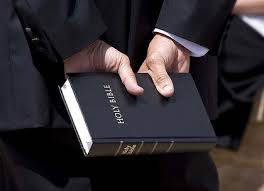GOD’S PROMISE OF A NEW HOME 
With all the problems, turmoil, tragedy, evil, insecurity, and sin, it is a good thing this world is not all there is. We have a promise of a new home. The Bible shows us God provides a permanent home where God will dwell with His entire family. It is a home with not health issues, insecurities, or sin. In Christ, we are promised the perfect home with Him. A life in Christ means life with Christ is forever. Our new home will also be in God’s presence. This is the final session in our studies about standing strong on God’s promises. How fitting it turns to Revelations.
Read Revelation 21:1-3
The Book of Revelation details the consummation of world history, in which God judges all those who reject His offer of salvation in Jesus Christ and oppose Him. Chapter 21 describes the time immediately after the Great Whit Throne Judgment, after Satan and all of God’s enemies have been condemned to the lake of fire (20:7-15). It details the coming of the new heaven and new earth, the time of the fullness of God’s rule and reign. God had promised Isaiah (65:17; 66:22) that He would create a new and eternal earth. The new world will be marked by perfect fellowship of believers with one another and with God, and is the final, perfected state of the universe as prepared by God. God’s plan here is that all are equal and all will be in a true relationship with one another. And God will bring this new order into existence at the end of history as we know it.
We don’t know how the new earth will look or where it will be, but God and His believers- those whose name is written in the Book of Life- will be united to live there forever. Basically, the Bible begins in a garden and ends in a garden. Yet between the two gardens a great deal of action, both sacred and secular, takes place. The sacred mainly concerns God’s redemptive efforts, and the secular concerns mankind’s sin, rebellion and puny self-efforts to realize their true destiny. The overall story is about paradise lost and paradise regained. Because people sinned, the material world somehow suffered from mankind’s fall (Gen. 3:17-18) and also will share in his redemption (Rom. 8:22-23). Although the prophet Isaiah was probably the first to envision an ideal society in which people “shall beat their swords into plowshares, and their spears into pruning hooks” (Isa. 2:4), others at different times also have dreamed of a perfect society. Plato conceived the idea of an ideal city-state. Later Thomas More wrote his idealistic Utopia (meaning “no place”). Roger Bacon wrote the New Atlantis, Karl Marx wrote his Communist Manifesto. More recently, Franklin Roosevelt proposed his New Deal, Harry Truman his Square Deal, John Kennedy his New Frontier, and Lyndon Johnson his New Society. I have seen many movies where some group is trying to make a “ideal world”- usually at the expense of someone or depriving some people of their God given free choice. The Biblical term for the ideal society is the kingdom of God!
In the new creation, there will be no “sea”. As noted earlier, the sea represented danger, turmoil, restless masses of people, and separation. The first beat came up out of the sea (13:1). John saw a sea before God’s throne (4:6), symbolizing His moral transcendence or holiness. On the island of Patmos, the sea separated John from those he dearly loved. Now in heaven there is no more sea, thus no more separation. Believers will enjoy God’s presence in the fullest sense and have sweet fellowship around His throne. Since the redeemed will be saved even from the presence of sin, there will be no residue of sin to prevent them from enjoying intimate fellowship with God. Revelation seems to depict mankind’s perfect environment as fulfilled in heaven, not during the millennium. Although in the millennium we will be with Jesus and there will be no Satan (until the very end).
Although John earlier had introduced the subject of the marriage supper of the Lamb (19:9), we now see its fulfillment. In contrast to the worldly city, John “saw the holy city, new Jerusalem, coming down out of heaven from God, prepared as a bride adorned for her husband”( v. 2). Since a city consists primarily of people, not buildings, we note further that John “heard a great voice from the throne saying, Behold, the dwelling of God is with men. He will dwell with them, and they shall be His people, and God Himself will be with them” (v.3). The word translated “dwelling” is the usual word for “tabernacle”, and the verb for “will dwell” means “will tabernacle” or “will pitch tent”. In fact, it is the identical verb used in John 1:14, which reads, “And the Word became flesh and dwelt among us”. The tabernacle symbolized the presence of God. Thus, God became present with people in the person of Jesus Christ, who truly was Emmanuel, “God with us” (Matt. 1:23). No God’s tabernacle or presence will continue permanently with His children in a much fuller sense than they realized His presence during their earthly experience. As Paul wrote, “to depart and be with Christ…is far better” (Phil. 1:23). Although believers are God’s people at all times, they will be His people in a more intimate and personal way in the new creation. While Moses in his human, finite state, could only see the “back” of God (Ex. 33:23), in heaven, all of God’s people will see Him face to face (1 Cor. 13:12. Even though now “we walk by faith, not by sight” (2 Cor. 5:7), then “we shall see Him as He is (1 John 3:2).
Read Revelation 21:4-5
Verse 4 describes God’s tender care for His children. “He will wipe away every tear from their eyes, and death shall be no more, neither shall there be mourning nor crying not pain any more, for the former things have passed away.” Some have wondered if tears may include those resulting from regret for deeds left undone, plus wasted opportunities to witness for Christ or minister to people in need. Apparently at some point God mercifully will blot out our remembrance of past failures and sins. Here the picture is one of perfect bliss. Death, mankind’s greatest enemy, will no longer exist for believers. Moreover, the mourning, crying and pain that accompany death will be unknown in the heavenly state. What a wonderful truth! Although John may have meant “former things” in a bad sense, the expression likely is broad enough to cover all earthly experiences and relationships. However, it seems very clear we will know all those in heaven from our earthly contact with them.
God has written the final chapter and it is a about true fulfillment and eternal joy for those who love Him. We don’t know as much as we would like but it is enough to know that eternity with God will be more wonderful than we could ever imagine. We will take our memories with us to Heaven. We are told we will give an account of our life before God. We will know everyone we knew on this earth who is in the New Earth (Acts 1:4-5; John 20:10-18; 20:24-29; 21:15-22). We will be able to be with our families, maybe even live in the same “mansion” (John 14:2-3). We will make new friends. I Thess. 4:13-17 says there will be a glorious reunion with friends and loved ones. We will enjoy fellowship with Noah, Abraham, Isaac, Moses, Joseph, Daniel, Ezekiel, Elijah, Esther, Mary, David and all the disciples. We can sit with them and ask them questions and just talk with them. We all –even if we can’t sing now- can go out to the parks of the New Earth and join in with the choirs of heaven. However, relationships with Jesus and God will be the most magnificent of all relationship.
God, of course, is the one “who sat upon the throne” and who said, “Behold, I make all things new” (v.5a). Again the word for “new” means renewed, refreshed, or renovated, not the word that means altogether new. The statement “for these words are trustworthy and true” is God’s most emphatic assurance to John that the vision of the new heaven and earth will certainly come to pass and that God Himself will accomplish His purpose (v.5b).
Read Revelation 21:6-8
The verb translated “It is done!” is plural and literally means “they have come to pass”, perhaps indicating the accomplished renewal of both heaven and earth (v.6a). Although yet future, the consummation of all things is just as certain as God’s promise. Further assurance comes from the declaration, “I am the Alpha and the Omega, the beginning and the end” (v.6a; 1:8; 22:13). God additionally declared, “To the thirsty I will give from the fountain of the water of life without payment” (v.6b; 22:17). This means we can do nothing to earn it. Since water is necessary for the life of human beings, animals, and plants, it became symbol for life. The psalmist compared the righteous with “a tree planted by streams of water (Ps. 1:3). Jesus said, “If any one thirst let him come to me and drink,” and He went on to say, “out of His heart shall flow rivers of living water” (John 7:37-38). Centuries earlier, Isaiah had uttered a similar invitation to “everyone who thirsts” (55:1). “Without payment” means that eternal life is a gift of God, thus all grace. “He who conquers” is one who has faith in Christ and consequently “shall have His heritage” and enjoy a true relationship with His Heavenly Father (v.7).
In contrast to God’s children, the “cowards” are fearful ones who abandon Christ at the threats of the beast. They fear persecution so badly that they choose temporary safety over eternal life. They are put in the same list as the unbelieving, the corrupt, the murders, the immoral, the idolaters, the liars, and those practicing magic arts. It says “their lot shall be in the lake that burns with fire and Sulphur, which the second death” (v.8). The “cowards” are those who did not have the courage to confess Jesus as Lord (Matt. 10:32-33). The people who are victorious “endure to the end”(Mark 13:13). They will receive the blessings that God promised: To follow Christ requires boldness and bravery to stand for Him when oppression occurs. Pray for courage to do what is right no matter what pressure you face. Those who can endure the testing of evil and remain faithful will be rewarded by God. Paul says in 1 Cor. 6:9, 11 that “you were washed, you were sanctified, you were justified in the name of the Lord Jesus Christ and in the Spirit of our God”. Consequently, forgiven sinners, whatever the nature of their sins, are no longer what they once were. They are truly God’s children. Only by accepting Christ’s salvation through faith and repentance can people avoid an eternity in hell! Or to express it positively, only true believers can claim God’s promise of eternity- in the New Heaven and the New Earth!




